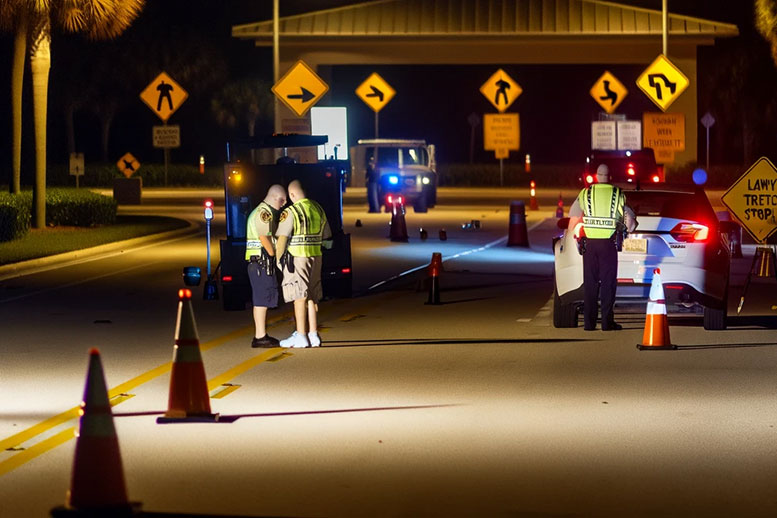DUI Checkpoints in Palm Beach County FL

Have you ever felt like law enforcement officials don’t have your best interests at heart? You aren’t alone—in one survey, 49% of Americans1 said they feel most police officers view themselves as “above the law.” This perception is especially strong when it comes to DUI checkpoints, also called DUI sobriety checkpoints.
At The DUI Center, our DUI checkpoint attorney Andrew Simko spent years working as a prosecutor here in Florida. We’re deeply familiar with the laws, questions, and penalties related to DUI checkpoints in FL as a result.
If you or a loved one are facing a DUI conviction due to an encounter at a DUI checkpoint, call us now at (561) 951-1264.
Are DUI Checkpoints Legal in Palm Beach County?
Yes, DUI checkpoints, also called DUI sobriety checkpoints, are legal in Palm Beach County. As of 2024, a total of 38 states and the District of Columbia have legislation in place for legal DUI checkpoints.
However, in order for DUI checkpoints in FL to be legal, law enforcement officials must follow a strict set of guidelines and protocols.
Legal Requirements for DUI Checkpoints in FL
Most of the legal requirements for DUI checkpoints in FL originated with one specific Florida Supreme Court case in 1986: State v. Jones, 483 So.2d 433. Then, a case 10 years later (Campbell v. State) reaffirmed the necessity of written guidelines.
Here are the requirements that must be met for DUI checkpoints to be lawful:
- A Notice to the Public must be issued and contain the who, what, when, where, and why of the DUI checkpoints.
- Signs must be placed well enough in advance for drivers to legally turn around before the checkpoint.
- Explicit directions are mandatory, such as “We will stop every 5th car between 10 pm and midnight; every 7th car from midnight to 5 am.”
- There must be a predetermined set of questions that all officers ask drivers
- There must be pre-determined specific signs of impairment officers must establish
- There must be a clear legal protocol for handling uncooperative drivers
- There must be backup plans for supervision depending on various conditions
These are the guidelines typically required of DUI checkpoints in FL. However, there are dozens of other requirements that the operation plan must meet.
Working with an experienced, knowledgeable DUI checkpoint attorney like Andrew Simko of The DUI Center is the best way to determine whether any guidelines were violated during the DUI checkpoint in question.
Your Rights and DUI Sobriety Checkpoints
The most important two things to know about your rights during DUI sobriety checkpoints are:
- If you can legally make a U-turn, you may turn around before reaching the DUI checkpoint
- If you proceed into the checkpoint, you must stop and interact with the police officers
Let’s say you see a checkpoint a few blocks ahead. If U-turns are legal at your current intersection, you can legally turn around and take a different path.
Just know that police officers often watch for this, and they still have the right to follow you and pull you over if you make the U-turn erratically.
You can never just drive straight through a DUI checkpoint without acknowledging the officers. If they ask you to stop or ask you to pull over, you’re legally required to comply. Driving away at this stage would be akin to fleeing from a traffic stop.
Lastly, you do retain a few specific rights during the interaction with police, including:
- The right to remain silent and not incriminate yourself
- The right to refuse a search without probable cause
- The right to refuse field sobriety tests
Penalties Related to DUI Checkpoints in FL
The penalties you may incur following an interaction with law enforcement at a DUI checkpoint in FL depends on the ultimate outcome.
If you make a U-turn to avoid the checkpoint, you may walk away with no penalties whatsoever.
But you must make the U-turn legally, without exceeding the speed limit or driving erratically. Even if you’re 100% sober, an illegal U-turn can result in an officer following you and issuing a traffic infraction.
If you choose to drive straight through the checkpoint without stopping or acknowledging the officers in any way, you can be charged with eluding or fleeing from a police officer.
Doing so is a third-degree felony in Florida, meaning you could face up to 5 years in prison, a $5,000 fine, and a suspension of your driver’s license—not to mention the issues that come with having a felony conviction on your record.
But what if you comply with what’s legally required of you, and you’re still arrested for DUI? In this scenario, you face these consequences:
- License suspension for at least 180 days
- Fines of at least $500
- Mandatory probation
- Six months in jail or more
- Mandatory community service
- Mandatory DUI re-education course
- Substance abuse treatment such as a 12-step program
Plus, if you have any prior DUI convictions on your record, these penalties become far more severe.
How a Knowledgeable, Attentive Florida DUI Checkpoint Attorney Can Help You
Defending someone charged with DUI following a DUI checkpoint is far different than cases resulting from a traffic stop. You need a skilled, knowledgeable Florida DUI checkpoint attorney who knows how to research whether the checkpoint was operating properly.
You see, when DUI checkpoints aren’t managed correctly, it’s all too easy for innocent drivers to say or do something incriminating. This is exactly why the legal requirements are in place.
As your attorney, Andrew Simko will do an independent investigation into the details of the DUI checkpoint in question. He’ll focus on suppressing any evidence that wasn’t gathered lawfully—which is often the lynchpin in securing a favorable outcome in these cases.
You have rights, and police are legally required to respect those rights. You shouldn’t have to sacrifice your freedom and your future for a simple mistake.
If you or a loved one are facing charges related to DUI checkpoints in Florida, call The DUI Center now at (561) 951-1264 for your free case evaluation.
FAQs About DUI Checkpoints in Palm Beach County
Are DUI checkpoint locations in Palm Beach County announced in advance?
Yes, DUI checkpoint locations in Palm Beach County must be announced in advance. This is thanks to a court ruling (State v. Jones, 483 So.2d 433 [Fla.1986]) which ultimately set the legal precedent for DUI sobriety checkpoints in Florida.
As mentioned in the above section regarding the various legal requirements, law enforcement organizations are required to comply with specific guidelines.
The easiest way to find out when and where DUI checkpoints are set up in Palm Beach County is by doing a quick online search. Because these announcements are legally mandatory, most local news outlets publish county-wide reports a few days in advance.
Can I refuse a breathalyzer test at a DUI checkpoint in Palm Beach County?
Yes, you can and absolutely should refuse a breathalyzer test at a DUI checkpoint in Palm Beach County. You see, DUI checkpoints, field sobriety tests, and DUI checkpoints serve little purpose other than giving the prosecution hard evidence against you.
It’s true that due to Florida’s implied consent laws, refusing the breathalyzer test at DUI sobriety checkpoints results in an automatic suspension of your driver’s license for at least one year.
The thing is, you’re still eligible for a hardship license—and the same isn’t necessarily true if you’re convicted of DUI.
The DUI Center recommends refusing the breathalyzer and immediately contacting us to help you through the application process, as you have a limited window of time to apply.
Can a DUI conviction from a checkpoint be expunged in Palm Beach County?
No, a DUI conviction from a checkpoint can’t be expunged in Palm Beach County— or any Florida county, for that matter. You also don’t have the option to have your records sealed.
This is why you should contact the FL DUI Attorney here at The DUI Center immediately following your DUI arrest. The sooner we can start protecting your rights, the less evidence the prosecution will have against you.
If you’re dealing with a potential conviction thanks to an encounter with law enforcement during DUI checkpoints, just call (561) 951-1264 now to schedule your free case consultation.
References:
- https://www.cato.org/survey-reports/policing-america-understanding-public-attitudes-toward-police-results-national#overview

 CALL US NOW
CALL US NOW






